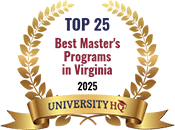
M.Ed. in Teaching (IDP) – NILD Educational Therapy Certification Program
Prepare to Make a Positive Impact with an NILD Educational Therapy Certification
Are you ready to gain the working knowledge and certification needed to help you become a successful educational therapist? Regent’s Master of Education (M.Ed.) in Teaching (IDP) – NILD Educational Therapy Certification Program offers unique teacher training in special education and is offered in partnership with the National Institute for Learning Development (NILD). You will learn methods for providing effective educational therapy to students with learning difficulties. You’ll also examine the NILD intervention model and learn effective assessment and individualized intervention techniques while developing cognitive competencies.
EXPAND YOUR CAREER PATH
Enjoy new opportunities in public, private, and higher education and the workplace.
GAIN FIELD EXPERIENCE
Observe and critique programs to better understand how to teach those with learning difficulties.
UNLOCK STUDENT POTENTIAL
Gain perspective and techniques that improve learning and success.
ALIGN YOURSELF WITH EXCELLENCE
Experience Regent ranked among top national universities by U.S. News & World Report for four years (2019, 2020, 2022 and 2023). Its programs have also been recognized among the top 5 online graduate education programs in Virginia for 9 years in a row (2015-2023). Regent graduates are empowered to make a difference in lives, which has led to more than 900 alumni being recognized as Teachers of the Year in Hampton Roads since 2004.
Presented from a Christian worldview, the M.Ed. in Teaching (IDP) – NILD Educational Therapy Certification Program is supported by award-winning faculty in Virginia Beach.
On completing the M.Ed. – Teaching (IDP) – NILD Educational Therapy Certification Program, you can:
- Integrate core areas of philosophy, leadership, curriculum and instruction, and technology.
- Identify, select, modify and use instructional materials to meet the needs of diverse student populations.
- Showcase a professional project customized to your area of interest – portfolio enhancer!
Career Opportunities
- Teacher
- Curriculum Developer
- Education Consultant
Students should refer to their catalog or audited degree plan (ADP) for required courses to complete their degree.
2025-26 Semester Check-In Deadlines
All students are expected to check-in for the semester two weeks before the session start date. Students should apply, be accepted, enroll in their first courses, and confirm a plan to pay for their courses prior to this date.
| Session | Semester Check-In | Session Start Date |
|---|---|---|
| Session A | Friday, August 15 | Monday, August 25 |
| Session M | Friday, September 12 | Monday, September 22 |
| Session B | Friday, October 17 | Monday, October 27 |
| Session C | Wednesday, January 7 | Monday, January 12 |
| Session T | Friday, January 30 | Monday, February 9 |
| Session D | Friday, March 6 | Monday, March 16 |
| Session E | Friday, May 1 | Monday, May 11 |
| Session F | Friday, June 12 | Monday, June 22 |
Admissions Requirements
Step 1: Apply to Regent University
Submit your application using the Regent University Online Application.
Note: If you are unable to complete our application due to a disability, please contact our Admissions Office at 757.352.4990 or admissions@regent.edu and an admissions representative will provide reasonable accommodations to assist you in completing the application.
Step 2: Submit Your Unofficial Transcripts
Submit your unofficial transcripts to regent.edu/items.
Upon submitting your application, you will receive an email requesting authorization for Regent University to obtain your official transcripts from your U.S. degree-granting institution. International transcripts must be evaluated by a NACES or NAFSA approved agency.
Step 3: Submit Your Government-Issued ID
To ensure academic integrity, Regent University requires a copy of a government-issued ID. Please submit a scanned copy or photograph of it to regent.edu/items.
Please feel free to contact the Office of Admissions at 757.352.4990 or admissions@regent.edu should you have any further questions about the application process.
Note: All items submitted as part of the application process become the property of Regent University and cannot be returned.
Part-Time Students
| Degree | Tuition Cost Per Credit Hour | Average Credit Hours Per Semester | Average Tuition Per Semester |
|---|---|---|---|
| Master of Education (M.Ed.) | $585 | 6 | $3,510 |
| M.S. in Library Science | $700 | 6 | $4,200 |
| Master of Arts (M.A.) | $820 | 6 | $4,920 |
| Educational Specialist (Ed.S.) | $820 | 6 | $4,920 |
| Doctor of Education (Ed.D.) | $820 | 3 | $2,460 |
| Doctor of Philosophy (Ph.D.) | $820 | 3 | $2,460 |
Full-Time Students
| Degree | Tuition Cost Per Credit Hour | Average Credit Hours Per Semester | Average Tuition Per Semester |
|---|---|---|---|
| Master of Education (M.Ed.) | $585 | 9 | $5,265 |
| M.S. in Library Science | $700 | 9 | $4,200 |
| Master of Arts (M.A.) | $820 | 9 | $7,380 |
| Educational Specialist (Ed.S.) | $820 | 9 | $7,380 |
| Doctor of Education (Ed.D.) | $820 | 6 | $4,920 |
| Doctor of Philosophy (Ph.D.) | $820 | 6 | $4,920 |
Student Fees Per Semester
| University Services Fee (On-Campus Students) | $900 (Fall & Spring) $750 (Summer) |
|---|---|
| University Services Fee (Online Students) | $750 |
PART-TIME STUDENTS
| Degree | Tuition Cost Per Credit Hour | Average Credit Hours Per Semester | Average Tuition Per Semester |
|---|---|---|---|
| Master of Education (M.Ed.) | $565 | 6 | $3,390 |
| Educational Specialist (Ed.S.) | $800 | 6 | $4,800 |
| Doctor of Education (Ed.D.) | $800 | 3 | $2,400 |
| Doctor of Philosophy (Ph.D.) | $800 | 3 | $2,400 |
Full-Time Students
| Degree | Tuition Cost Per Credit Hour | Average Credit Hours Per Semester | Average Tuition Per Semester |
|---|---|---|---|
| Master of Education (M.Ed.) | $565 | 9 | $5,085 |
| Educational Specialist (Ed.S.) | $800 | 9 | $7,200 |
| Doctor of Education (Ed.D.) | $800 | 6 | $4,800 |
| Doctor of Philosophy (Ph.D.) | $800 | 6 | $4,800 |
Student Fees Per Semester
| University Services Fee (On-Campus Students) | $850 (Fall & Spring) $700 (Summer) |
|---|---|
| University Services Fee (Online Students) | $700 |
*Rates are subject to change at any time.


